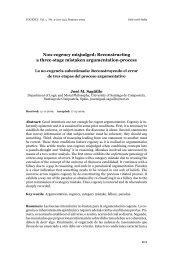Cogency v2 n2
Cogency v2 n2
Cogency v2 n2
You also want an ePaper? Increase the reach of your titles
YUMPU automatically turns print PDFs into web optimized ePapers that Google loves.
COGENCY Vol. 2, N0. 2, Spring 2010<br />
5. Conclusion<br />
Despite the revolutionary changes that distinguish Wittgenstein’s early philosophy<br />
from his later philosophy, and for all the evolutionary changes from<br />
the Tractatus through the transitional works to the Investigations in his<br />
style of argument (and also despite his own reputation for being personally<br />
argumentative), there is one constant in Wittgenstein’s metaphilosophy:<br />
argumentation is not an essential part of philosophy. Depending on the context,<br />
argumentation may even be antithetical to the goals of philosophy.<br />
Even so, argumentation can be a valuable tool for philosophers because its<br />
real value is sometimes found in its point rather than its content, its consequences<br />
rather than its conclusions. This is especially true of philosophical<br />
argumentation precisely because philosophy is not a body of knowledge. It<br />
is not a discipline.<br />
Arguments can be conceptualized in many ways, but most of the prominent<br />
models for argumentation do not fit into the Wittgensteinian understanding<br />
of philosophy. Arguments can be understood as proofs, demonstrations<br />
of knowledge, but there is no philosophical knowledge, so that kind<br />
of argumentation has no place in philosophy. Alternatively, arguments can<br />
be seen as attempts as rational persuasion, but even if there were something<br />
in philosophy to persuade others of, there would be no reason for doing<br />
so, so once again argumentation seems out of place in philosophy. And<br />
if we prefer to think of argumentation as a procedure for dispute resolution,<br />
the situation is the same: philosophical differences are not genuine differences,<br />
so consensus and agreement are beside the point. What we need to<br />
eliminate is confusion, not difference of opinions or beliefs – and for that<br />
philosophical goal, argumentation is still an inappropriate tool.<br />
In sum, there is nothing in the standard logical, rhetorical, and dialectical<br />
conceptions of argumentation to recommend it to a Wittgensteinian<br />
philosopher.<br />
What emerges is an altogether different appreciation for what arguments<br />
can do. In his Remarks on the Foundations of Mathematics, Wittgenstein<br />
connects the sense of a proposition in mathematics with its proof. Proofs<br />
establish the connections which serve to define the concepts involved. Otherwise,<br />
there would be no point in offering different proofs for established<br />
theorems. As a corollary, any formula that we end up proving always has a<br />
38








